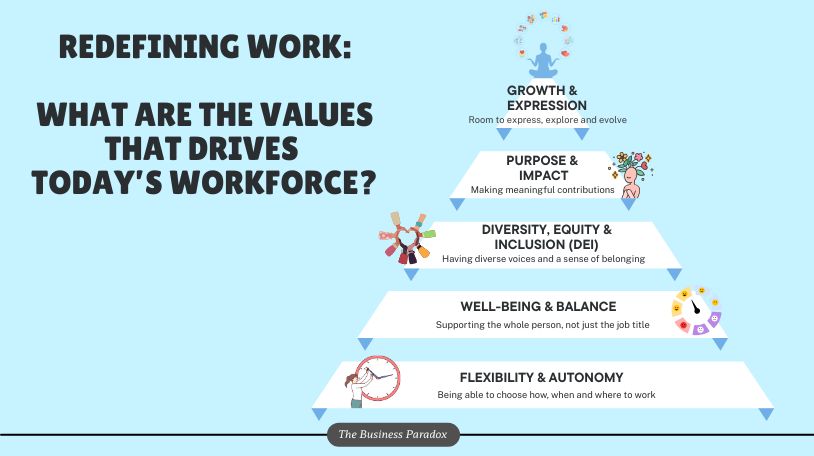With Gen Z and Millennials entering and dominating the workforce, many business leaders are faced with the timeless challenge of managing generational differences and effectively engaging the younger generation. Each generation has its own set of values, priorities, and perspectives toward work, which can often lead to misalignment and misunderstandings between older and younger employees.
Where Baby Boomers and Gen X often emphasize loyalty, stability, and traditional career paths, Gen Z and Millennials are driven by a different set of values and career priorities. They seek purpose-driven work, flexibility, and autonomy, and they place high importance on mental health and well-being. Understanding these shifts, which are shaped by today’s economic, political and social climate, is essential for effective leadership. While their perspective may be unfamiliar and unconventional, they offer a unique opportunity for businesses to tap into fresh insights, creativity, and resilience.
In this article, we’ll explore five key lessons business leaders can adopt to harness the strengths of Millennials and Gen Z as generational dynamics continue to evolve. By understanding what drives the next generation and how their perceptions of work are reshaping the workplace, business leaders will be better positioned to lead effectively and unlock new perspectives.

1. Embrace Flexibility and Remote Work
Both Millennials and Gen Z value flexibility, but many Gen Z employees increasingly expect remote work to be an option. For Gen Z, flexibility is not only about convenience; it’s about maintaining their mental health and personal well-being. The ability to work remotely or set flexible hours is becoming non-negotiable for younger employees, especially given their desire to seek fulfillment beyond the 9-to-5. This demand for flexibility is driven by their desire to balance work with personal pursuits, such as traveling or content creation. The COVID-19 pandemic reshaped the landscape of remote work, but Gen Z strongly values digital connectivity and autonomy. This younger generation of employees wants the freedom to be able to work from home, on the go, or while traveling.
In the latest Gallup poll (2025), 27% of U.S. employees now work fully remote while an additional 52% operate in a hybrid setup – making flexible work arrangements the new norm. This trend of remote and hybrid work models appeal to Millennials and Gen Z not just for the flexibility, but for the practical time and cost savings they offer by eliminating the daily commute. Where earlier generations may have defined themselves by their careers, Millennials and Gen Z see work as a way to afford and sustain their lifestyle outside of their careers.
Key Considerations for Leaders:
- Offer flexible work arrangements such as remote work, hybrid schedules, or flexible hours
- Create collaboration tools that support distributed teams to maintain productivity across different time zones and locations
- For Gen Z, the ability to work from anywhere may be the key to attracting top talent
2. Support Balance and Employee Well-being
While both generations value flexibility, their motivations may differ. For Millennials, work-life integration isn’t just about time management – it’s about finding fulfillment in their careers as they want work that aligns with their personal values. Their desire for purpose can sometimes make it feel like work and personal life are one, as their passions and career aspirations overlap.
On the other hand, Gen Z employees is reframing the idea of ambition, integrating career with personal development. Rather than climbing the corporate ladder, their vision for work is shaped by a pragmatic desire for clearer boundaries, personal well-being, and a more structured approach to balancing their work and personal lives. They are more likely to view work as a necessary part of life, but not the defining aspect of it. Gen Z employees prioritise mental health, time for personal interests and the freedom to enjoy life outside of work. They are more likely to choose work settings that support their mental and physical well-being, which is deemed important for maintaining productivity and job satisfaction. These shifts reflect a broader rethinking of how younger generations relate to work and what they expect from it.
Key Considerations for Leaders:
- Shift the focus from hours worked to outcomes and results delivered (i.e., measuring performance based on output)
- Encourage open communication and hold regular check-in session with employees to understand how they are managing their workload
- Management can lead by example by openly taking time off for family or personal commitments and refrain from sending work-related communication during off-hours unless necessary
3. Leverage the Power of Personal Branding and Social Media
With social media deeply embedded in their daily routines, Millennials and Gen Z are more likely to invest time into crafting their personal brands and engaging in content creation. This reflects a deeper desire for autonomy, creative expression and control over their own narrative. For many, it’s also an opportunity to diversify income streams and create career opportunities for themselves beyond a single employer. Authenticity is a core value for Gen Z, and personal branding allows them to express their individuality, differentiate themselves and communicate who they are beyond traditional job titles.
Research conducted by Visa (2024) found that 45% of Gen Z employees engage in side hustles alongside their full-time jobs. The top three side hustles include e-commerce, social media influencer and passion projects, highlighting their desire for creative freedom and alignment with personal interests. With growing economic volatility and limitations of relying on a single income, Gen Z professionals choose to adopt an entrepreneurial approach. Side hustles allow them to experiment with ideas and build up skills that may not align with their primary job. More importantly, when younger employees are encouraged to cultivate their personal brand in alignment with company values, they are more likely to promote the business authentically and they become brand ambassadors. This type of engagement will resonate with audiences in a way that extends beyond the limits of traditional marketing.
Key Considerations for Leaders:
- Provide opportunities for employees to produce content that highlights their role in the company and feature employee-generated content on the company’s social media channels
- Recognize the power of social media influence and consider involving employees in brand advocacy, especially if they have a strong online presence
- Provide training and offer resources, e.g., design tools or social media guidelines, to help them maintain a consistent and professional online persona
4. Foster a Culture of Purpose
Both Millennials and Gen Z are acutely aware that work occupies a significant portion of their lives, and they are intentional about where they choose to invest their time and talent. As such, they are not just looking for a job, but they seek out workplaces that align with their values. Leaders need to move beyond the traditional “upward” model of career progression given that the younger generation value skill diversity, exploration and career agility over linear advancement. When employees feel that they can grow in ways that align with their strengths and evolving sense of purpose, they are more likely to be engaged, propose new ideas and take initiative at work.
While Millennials are often passionate about aligning their careers with meaningful causes, Gen Z is increasingly more pragmatic, focusing on job security in an uncertain economic environment. Businesses that articulate and embody a clear sense of purpose will attract top talent and have a better chance of retaining it. When Millennials and Gen Z find their work meaningful, they are more likely to stay with an employer long term, boosting loyalty and reducing turnover. For business leaders, this presents an opportunity to cultivate a workplace culture rooted in purpose and impact.
Key Considerations for Leaders:
- Offer flexible career pathways and multidimensional growth opportunities such as lateral moves, short-term internal gigs or mentorship initiatives that allow employees to grow both professionally and personally
- Create a purpose-driven culture by regularly communicating how individual roles tie into the company’s overall mission to foster a sense of fulfilment
- Encourage employees to participate in volunteer work that ties into the company’s values by partnering with local charities, non-profits, or community organizations
5. Prioritise Diversity, Equity, and Inclusion
Both Millennials and Gen Z are deeply committed to diversity, equity, and inclusion (DEI), as they grew up in an era where movements for gender equality and racial justice are more prominent. These generations are more socially conscious – they want to see women and underrepresented groups in leadership. They value a workplace culture that respects differences and policies that ensure equity in opportunity. Gen Z has raised the bar, expecting more from their employers in terms of representation and inclusivity. Gen Z employees are vocal about social issues, and they expect the brands they work for to engage meaningfully with causes related to race, gender, and other forms of identity. While some leaders may question the future of DEI, younger employees continue to champion it as they expect workplaces to reflect the diversity of the world they live in. For this generation, inclusivity is not just a trend or a checkbox, but an essential value they seek in their employers.
Key Considerations for Leaders:
- Diversify leadership by actively recruiting, retaining, and promoting diverse talent in leadership positions
- Provide unconscious bias training and cultural competence workshops for all employees, especially leaders and managers
- Create safe spaces for feedback by conducting employee engagement surveys that include DEI-focused questions, allowing employees to voice their opinions and experiences

Embracing the Shift in Work Ethics
The evolving values of Millennials and Gen Z are not signs of entitlement – they reflect a generational recalibration of what work can and should be. This does not necessarily mean there is a decline in work ethic or ambition, but the next generation of workers are committed to different things: flexibility, well-being, personal growth, purpose and inclusion. These preferences are simply adaptations to a fast-changing political, economic and social landscape. While their perspectives may differ from the previous generations, they offer new ways of thinking that challenge outdated systems and encourage healthier workplace cultures. It provides an opportunity for businesses to evolve and create more flexible, purpose-driven, and inclusive environments.
For business leaders, placing unfair judgements on younger employees through outdated lenses means missing out on the potential they bring. Embracing flexible work, encouraging personal branding, fostering purpose, and committing to diversity will ensure that businesses can continue to attract and retain the next generation of talent. Instead of resisting these shifts, forward-looking leaders can harness them to create an environment where all generations thrive. Leaders who understand and adapt to these generational shifts will be equipped to navigate these complexities and co-create the future of work with the next generation. In the end, these generational differences are not meant to divide us, they are bridges to a better, more inclusive way of working.
Stay ahead with exclusive insights! Sign up for our mailing list and never miss an article. Be the first to discover inspiring stories, valuable insights and expert tips – straight to your inbox!




